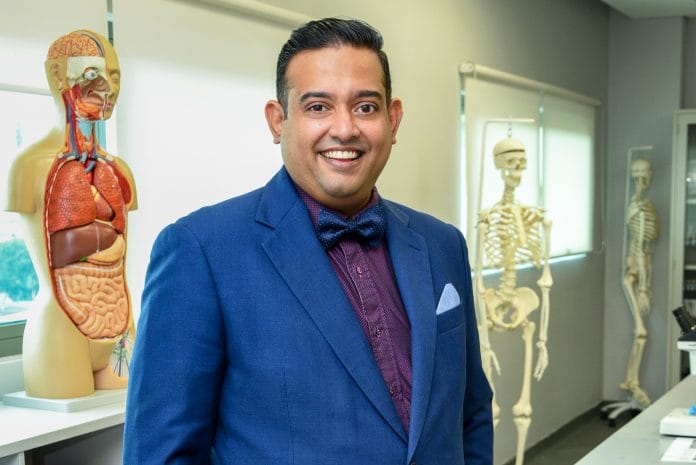
PROF DR ABHI VEERAKUMARASIVAM who was the first Asian to win the FameLab International Award in 2015, a Cambridge graduate and an active cancer researcher plays multiple national and international leadership and strategic roles related to life sciences. He shares his thoughts with The Petri Dish Editor-in-chief, DR MAHALETCHUMY ARUJANAN, on producing globally competent students who can rise to the challenges of the 21st century and beyond, in a recent interview.
“WE want to produce global citizens and students who are engaged intellectually and emotionally towards finding solutions and making a positive impact”, says Prof Dr Abhi Veerakumarasivam (Abhi), Dean of the School of Medical and Life Sciences at Sunway University.
According to him, good students are not just defined by grades but those who are constantly trying to improve themselves, who are genuinely curious, articulate and explore critical questions rather than those who merely seek exam tips. Good students are not preoccupied by how much time they put into their work (be it classes or lab work) because they are driven by the passion to satisfy their curiosity and answer relevant questions. They are more concerned about the quality and relevance of their work.
“Attitude triumphs aptitude” is the principle that resonates with Abhi in the context of producing world-class graduates who are able to adapt and remain relevant in spite of the disruptive changes taking place in all sectors and also those brought on by the global challenges such as the challenges faced now during the present pandemic.
“COVID-19 revealed that we need new skills sets and individuals who are capable of making themselves essential, creating their own future and reshaping their careers”, says the dean, who is the former chair of the Young Scientists Network-Academy of Sciences Malaysia that represents top young researchers in the country who are committed towards nation-building through science, technology and innovation.
He says, in order to be adaptive and responsive to the changing environment of the industry, the School of Medical and Life Sciences offers students flexibility and ample opportunities to innovate.
“We have strong translational research projects in addressing infectious diseases as well as non-communicable diseases such as cancer, allergies and mental health”, says Abhi, referring to his school’s research priorities.
One may wonder why a university with strong biomedical and biotechnology programmes offers biodiversity and ecology subjects or how would taking psychology subjects help biotechnology students in their career?
“Our undergraduate and postgraduate courses allow students with a diverse interest to explore their calling and passion as well as to deepen their learning as they reflect on the connectivity between what they learn across different disciplines. The reality is that all the grand challenges that humanity is facing require an interdisciplinary approach to holistically and comprehensively approach it.”
“The pandemic is a stark reminder of how human health intersects with the natural environment and more importantly, how we must rebalance our relationship with nature if we are to reduce the risk of future zoonotic disease outbreaks.”
“The establishment of the Sunway Centre for Planetary Health, led by Tan Sri Jemilah Mahmood provides a great opportunity for our students to be trained and lead concerted efforts to achieve the highest standards of health, wellbeing, equity and sustainability worldwide”, says the confident and forward-looking dean.
He also says that the global threat of fake news and vaccine hesitancy also sheds light on how equally important it is for biotechnology and biomedicine graduates to better understand human behaviour and psychology to build trust and compliance to public health strategies.
According to him, a science degree is not just for someone who is research-minded but many who may not necessarily want to spend their lives in the laboratory can still find fulfilling careers as the science-related sectors offer many opportunities outside the confines of a laboratory.
He also points out: “A closer network between students and industry is made possible through the myriad of business divisions within the Sunway Group, where students are exposed to and can be involved in solving real-world problems.
“For example, thanks to the benefaction and efforts of the founder and chairman of the Sunway Group, Tan Sri Jeffrey Cheah, the Sunway Pyramid Convention Centre was used as a mega COVID-19 vaccination centre and many of our students had the opportunity to volunteer there. This gave them a lifetime experience of being involved in Malaysia’s biggest vaccination programme and appreciate the complex logistics, medical needs and surveillance”, he adds.
Asked how is the demand in Malaysia for graduates in life-sciences and biotechnology, Abhi was quick to say, “this is the best time”.
“The pandemic has accelerated the biotechnology industry and created mainstream awareness of its importance in healthcare. Without the development of vaccines as well as the screening and diagnostic kits, the socio-economic burden would have been far worse. We certainly would not be thinking about the possibility of a post-COVID-19 future.”
He says graduates with both technical and entrepreneurship knowledge and skills can set up diagnostics, analytical and sequencing laboratories and this will further spur the local bioindustry.
The current pandemic has forced universities to adopt online teaching and is this a boon or a bane?
Abhi sees it as a major advantage: “Education is about improving cognitive abilities; psychomotor and affective skills and our online classes are designed to offer all these skills. In fact, in some areas we see more interaction and participation from the students”, he enthuses.
The COVID-19 pandemic may have brought unprecedented digital acceleration, but it has also emphasised the need for human interactions and focusing educational approaches that are student-centred. He explains that virtual classes are deliberately made small with less than 25 students. Practical classes are also designed and delivered in such a way where students do not miss out on learning research skills. Lecturers carry out live demonstrations and students are given simulated data to test their hypotheses and make inferences. Sunway University has invested significant resources in its IT infrastructure and learning management system to ensure quality education provision throughout the pandemic.
“We also run ‘boot camps’ for our students who were able to return physically to our laboratories and we prioritised the most relevant skills in the industry such as PCR, ELISA, histology, flow cytometry, running gels and sequencing. For the most part, our research laboratories have also been open throughout the pandemic, thanks to the government’s recognition that research is an essential activity”
“Thus, we have been able to ensure that our students are not missing out on their psycho-motor skills,” affirming that the graduates would be ready for the industry.
Abhi emphasises that “affective skills” are embedded from the start to create graduates who are caring, have passion and love for what they do and to shed off the silo mentality.
“We want our students to be agile and dynamic – who are always looking for opportunities to integrate themselves into various activities or initiatives and have the love for discovery,” says the current Chair of the International Network for Government Science Advice – Asia.
The school also conducts town hall sessions and various social activities to engage and integrate students from various fields and it has been very successful in achieving this.
Abhi notes that many societies attract students from beyond their own fields such as the Sunway Psychology Club, Sunway Future Nurses Club and Sunway University Biological Society.
“This aligns well with the post-COVID-19 era where an individualised world can no longer thrive.”
“The interactions fostered by these student societies build humility, empathy and the capacity to connect and empower fellow students to understand that they are not victims of their circumstances but a product of the choices they make,” explains Abhi.
Moving forward, Abhi says Sunway University is looking into incorporating the MySTIE (science, technology, innovation and economy) framework developed by the Academy of Sciences and the Ministry of Science, Technology and Innovation Malaysia into its education, research and service mission, especially in digital health and precision medicine.
“It is so important to harness the transformative potential of scientific and technological advances to drive economic growth and societal well-being”
Leveraging on its prestigious partnerships with the University of Cambridge, University of Oxford, Harvard Medical School, Massachusetts Institute of Technology (MIT) as well as local strategic partners such as Universiti Kebangsaan Malaysia, Sunway University will reinforce Sunway Group’s efforts in progressing the healthcare landscape in the country and region.
“We are currently accelerating our research efforts in healthy ageing and wellbeing in line with Tan Sri Jeffrey Cheah’s vision to ensure that Sunway City is a model inclusive society with state-of-the-art facilities and resources that enable and promote the participation of the elderly in the city’s social, civic and economic life. Our students will be at the centre of all these exciting endeavours”, says Abhi.














